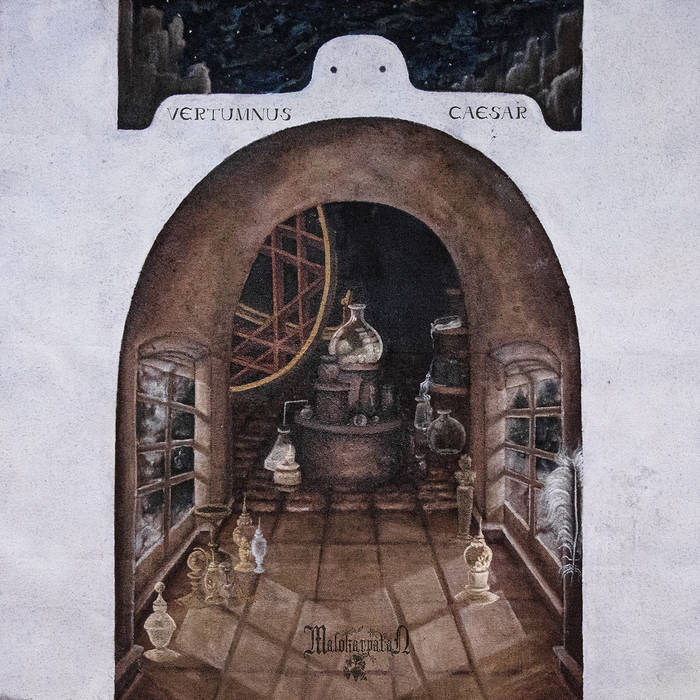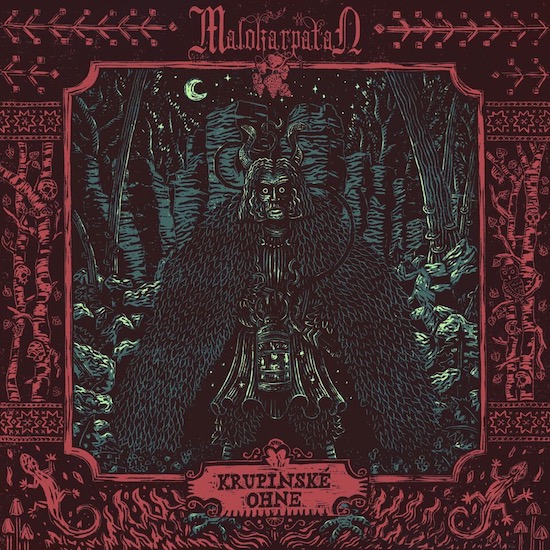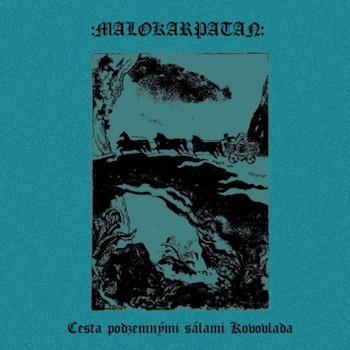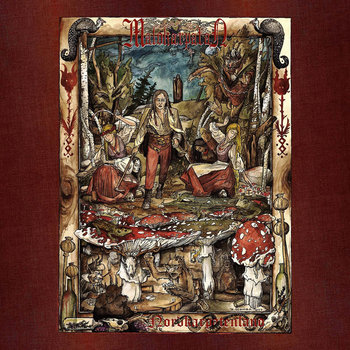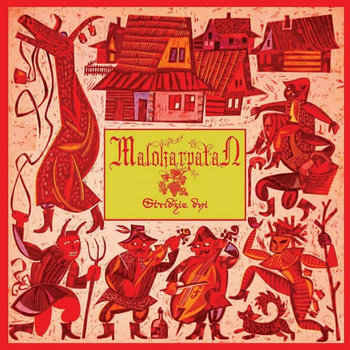Malokarpatan - Interview
First Wave Black Metal bands from former Eastern Bloc countries played a big role in the development of the extreme metal underground in the late 80's and have also influenced a lot of bands which were conceived during the second wave in the 90's. These bands combined the elements of European thrash metal such as Destruction, Sodom and Kreator with first wave bands like Hellhammer, Celtic Frost, Bathory, Venom, alongside some occult heavy metal like Mercyful Fate/King Diamond. The key figures in that particular wave of bands are known as Tormentor, Kat, Master's Hammer, Root, Törr, Fata Morgana, all of which possess a very unique atmosphere with a certain evil presence and occult vibes. Sadly, not many bands would carry over that sound and style in the 90's, especially when second wave black metal from Norway became the primary template for the genre and pretty much every band went down that path. However, things would take an usual turn of events when a new band emerged around 2014 in Bratislava, Slovakia, and resurrected that occult magic which was haunting the somber areas of Central Europe. The band I am referring to is none other than Malokarpatan, whose music is dubbed as dark heavy metal from the eastern woodlands, known for combining first wave black metal with old school heavy metal, while dealing with various themes involving Slovak folklore, witchcraft and dark ages. The band has had a very successful run with their releases, especially their third album "Krupinské Ohne" which became a fan favorite from the band's discography. This year, Malokarpatan released their fourth album "Vertumnus Caesar" on October 27th via Invictus Productions, which introduced themes of esoteric arts, all the while continuing to push forward their signature dark heavy metal sound. For this occasion, I had the pleasure to exchange words with the band's guitarist Adam S., where we talked about the work on "Vertumnus Caesar", including the band's collaboration with Olof Wikstrand on the mixing of the album, as well as Adam's other black metal project Stangarigel.
Vladimir
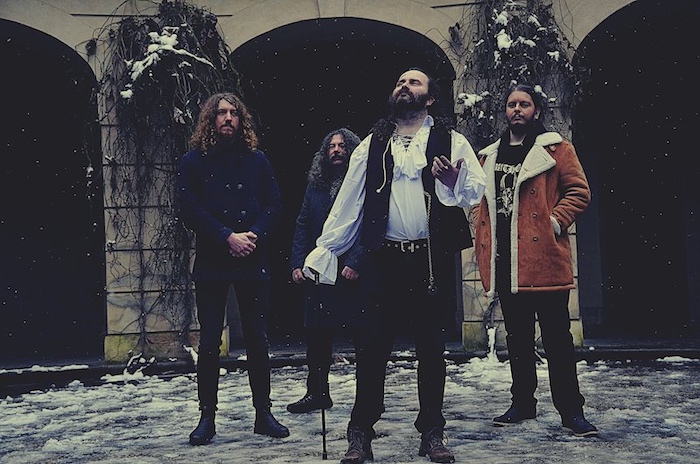
Greetings Adam! First of all, I'd like to wish you a warm welcome on behalf of the MetalBite crew. How are you doing brother?
Hey Vladimir, cheers! Hope things are going well down in the wild Balkans. Doing fine, enjoying the somber autumn ambiance outside and I'm slightly brain dead from the promo interviews cycle, haha.
I just listened to Malokarpatan's new album "Vertumnus Caesar" and I was absolutely overwhelmed with what you made. This album really has an interesting concept about esoteric arts which is a fantastic expansion to your themes of folklore and witchcraft. What inspired the band to write an album revolving around the mysterious life of Emperor Rudolf II?
Thank you kindly! I've been obsessed with the enigmatic figure of Emperor Rudolf II since my early childhood and I kinda knew I had to make an album about him one day. There's a cult 1950s Czechoslovakia era movie called "The Emperor and the Golem" which they always play on TV around Christmas time and I religiously re-watch it each year. Due to the strongly communist official mindset of those days, the tone is a comedic one and Rudolf is portrayed as a fool, but despite all that it has an incredible atmosphere of Late Renaissance magic which made me obsessed with it. Around the time I became a teenager I started reading historical books about his life and those were also the main inspiration source for the lyrics. The album mentions some important moments of his life, such as his early years spent receiving royal education at the Spanish court and his miserable final days when he would roam the corridors of Prague castle in paranoia, looking for assassins which he believed were sent to get rid of him, so his brother Matthias could take the entirety of his reign. But the majority of the album deals with his burning desire for knowledge, which in the pansophist ideals of the time meant looking everywhere from the natural world to the supernatural. His court was known as a safe haven for all kinds of alchemists, hermeticists, astrologers and scriers, who were often in trouble with the Church elsewhere in Europe. Like him I also have a lifelong passion for the arts and different types of hidden knowledge, so I felt like I could understand some of his inner longings. So it might sound like a paradox, but doing an album about him was an extremely personal endeavor for me.
Since I already touched on the subject of the band's lyrical themes, are there any exceptional works of film, literature and art where the band usually looks for inspiration?
It's always a vast web. I'm a huge fan of classic Czechoslovakian cinema, especially from the 60s and 70s when it peaked in my opinion. For Vertumus Caesar, I was also highly inspired by Ken Russell's Lisztomania. I kind of envisioned the album as a Rudolf II biopic made by Russell in his most unhinged era. Other inspirations came from local series and movies like "Physician of a Dying Time" and "Prague Nights", which we both also sampled on the album. From visual arts it's been several things from Giuseppe Arcimboldo, Pieter Brueghel the Elder up to Art Nouveau era and Hugo-Steiner Prag's illustrations for the The Golem novel by Gustav Meyrink. Musical inspirations were anything from The Jilemnice Occultist, "Let Draka" by Drakar, Black Sabbath around the "Sabbath Bloody Sabbath / Sabotage" era, King Crimson, Popol Vuh, Goblin, all the way up to baroque and renaissance music.
You took on an incredibly difficult task to work on a follow up for your highly praised third album "Krupinské Ohne" which really seemed impossible to top, especially since it was still fresh 3 years after it was released, yet you managed to come out triumphant in the end with "Vertumnus Caesar". How was the overall songwriting and recording process of "Vertumnus Caesar"? What was the band's primary focus when working on the new material?
Krupinské Ohne was a very divisive album, some people consider it as our best, others were put off by the sort of labyrinthine nature of the compositions. I purposely made it a bit odd, a one-time experiment in a way. With Vertumnus Caesar, we went back to the shorter and catchier compositions like we did on Nordkarpatenland, but since we also want to keep evolving all the time, we kept the 70s progressive rock influences of the third album and doubled down on them. It was a long-complicated process though, because as weird as it may sound now, the album first started as my attempt to go back to basics, with as few additional arrangements as possible. It was supposed to be a stripped-down record influenced mostly by early Czechoslovakia era metal from the 80s and early 90s. But I kept getting more and more ideas after listening to a ton of 70s records, so in the end the album turned out to be our most 70s influenced one. I am a slave to the music's calling, so wherever it leads me, I follow it there, without caring about what the reactions will be. It's a risky system of working if you want to keep selling records, but for me the artistic value is above anything else and I always count on the possibility that whichever next record might be a commercial suicide haha. As soon as I decided that the Rudolf story would be the album's topic, I just kept adding all kinds of extravagant ideas to it, because I wanted to create a truly magical atmosphere that would transport the listener straight to his court of wonders.
I must say that I was really amazed about the band's musical direction for this new album, particularly on the fifth track 'Panstvo Salamandrov Jest V Kavernách Zeme' which has a heavy influence of 70's psychedelic/progressive rock with a film soundtrack quality to it that reminded me a lot of the Italian band Goblin. Besides heavy metal and black metal, what were the primary musical influences for the songs on the new album, especially the fifth track?
The 'Panstvo' song was also influenced a lot by the guest contributions by The Templar and The Sorceress from Hands Of Orlac. I became friends with them during the time I lived in Sweden, because our drummer Axel also plays with them and we share a lot of musical influences together. Filippo "The Templar" is a huge Goblin fan, so I just let him go crazy in his Italian ways and he changed the overall mood of the song so much that I credited him as a co-writer for it. I composed the basics of the song on guitar and the influences were as follows: Ozzy Osbourne especially on the amazing "Diary Of A Madman" record, baroque music seen through 80s heavy metal lens, Popol Vuh, Viking era Bathory/Kärgeräs era Root, maybe a bit of Jethro Tull in the flute section and then the psychedelic drum solo at the end was inspired by Led Zeppelin (John Bonham's solo in Seattle 1977) and ELP (Toccata from Brain Salad Surgery).
Something which I believe deserves an extra bit of praise is the brilliant sound production which is a wonderful balance between the modern sound and old school 80's traditional heavy metal sound. The biggest factor which contributed to the album's overall sound is the mixing done by Olof Wikstrand of Enforcer at Hvergelmer Studios. How did the whole collaboration with Olof go? Was it challenging for any of you?
I always use new people for both the artwork and mix with each album, in order to keep ourselves from repeating the same thing. A lot of musicians I admire had this approach which kept their output inspired – David Bowie and King Crimson most notably. It's OK repeating yourself if you're AC/DC or Motörhead, but for most bands that means stagnation and boredom at some point. I thought about picking the right person for Vertumnus Caesar a lot, because it's a bit of a special record for us. It has all these different layers going on all the time, so I realized we need a conservative element, someone who would hold all that together like glue. So, Olof came to my mind especially after I liked his work on the second Helvetets Port album and I've been a fan of Enforcer since Diamonds too. He does listen to a wide variety of 70s rock records like us, so he understood that element, but he's also firmly rooted in traditional heavy metal and that was the "glue" I was looking for. Someone to keep our gravity, so we don't completely fly off to prog rock dreamlands. I must say the co-operation with him was so far the smoothest one I've ever had with a sound engineer. He was very helpful and understood what I wanted, so the only things we'd discuss were mostly small details like putting the synth louder and so on. The end result is our by far the most professional sounding album, kind of like a big budget production from the late 70s or early 80s. It doesn't immediately scream "retro" which is great, because I never thought of us as a retro band. It's perfect for what it is, and next time we'll once again do something different because such is the ever-shifting nature of Malokarpatan.
What I admire about Malokarpatan's music is the wonderful combination between old school heavy metal and first wave black metal bands, preserving the musical DNA of bands like Kat, Tormentor, Master's Hammer and Root. Do you think that Malokarpatan could in some ways be considered as a spiritual successor to these bands?
I would hope so, but it's ultimately up to the audiences and time itself to make a judgment about us. That early Iron curtain style of black metal from the pre-Norwegian era is a very forgotten kind of sound and we're proud to be one of the bands that revived it and developed it into recent times. When you listen to material like "7th Day Of Doom" by Tormentor or even more obscure later records like the forgotten "Bloody Mary" album by Tudor, you can hear how far-reaching this style is. You have black metal in a very early primal form, where it branches out to older influences like classic 80s heavy metal and even hard rock from the 70s. That's the sort of mysterious, ephemeral sound we're after. While being very "old" sounding, it can go really far regarding various influences and directions. So you can be progressive and old-fashioned at the same time, which is a wonderful combination in my opinion.
What kind of status does Malokarpatan have in the Slovakian metal scene and even in the Czech Republic? What is the general feedback that you get from people in your home and in neighboring countries?
We've always been more popular abroad than at home, which is an interesting paradox since both our music and lyrics are so much influenced by our surroundings. I would guess the main reason is that people on the average tend to prefer so-called modern metal here. There's this whole sentiment about old school metal being clumsy, old-fashioned, not fast and technical enough, not polished enough, too naive lyrically etc. People use a local term "agro metal", pertaining to classic heavy metal being popular among less educated people from agricultural/rural areas, while the real deal is supposed to be The Ocean, Gojira or whatever bullshit. That's something we never cared for and were proud to go against the grain. Nowadays though, I'd say our support at home is a lot better than in the beginnings of the band. I guess it took us being accepted out in the world before they could accept us at home. As cliché as that sounds, I always make the music firstly for my own satisfaction, so I wouldn't care much either way.
On top of that, have you received any positive comments from veteran metal musicians in both countries?
Most of them are too old to pay attention to new music especially if they have to dig in the underground for it, so there hasn't really been much of that. We've co-operated with some former Master's Hammer members who said positive things about our music which of course was a wonderful feeling. But on the average, it comes more from abroad, like Scandinavia or the USA.
Beside Malokarpatan, this summer you also released a new EP "Metafyzika Barbarstva" from your other black metal project Stangarigel. It seems that you were quite prepared to conquer this entire year with both bands you play in. What is the story behind the formation of this project?
I formed Stangarigel in 2020 as a means to filter out all the ideas I have which are incompatible with Malokarpatan, because they are inspired by the Norwegian and generally Scandinavian 2nd wave of black metal, especially from around the mid 90s with records like Bergtatt, Stormblåst, Forests Of Witchery, The Shadowthrone etc. That would be a tasteless mix if incorporated into Malokarpatan, because our influences are generally much older there. 2nd wave black metal is a style very close to my heart with which I've grown up as a kid in the 90s, thanks to having an older brother who got me into metal early on. I used to play it in some of my early demo bands, but then abandoned it because I felt like everything was already said there and I could never make anything better than the classic albums. That part is still true, but I just felt an increasing nostalgic longing and I missed that specific sound in a lot of current black metal. It has changed for the better a bit in the last few years, but some years back you've had all these bands with hoods and boring disharmonic "riffs" from whose songs I can't remember a single moment. Back in the 90s you still had real songwriting, with memorable riffs instead of this ambient noise flow of random notes that is much of modern black metal. I missed that feeling a lot, which ultimately led to the Na Severe Srdca album. Now we have the mini LP out too and I plan to record another full-length next year.
Other than music, what would you consider the major difference between Stangarigel and Malokarpatan? How does one compare to the other?
Stangarigel is influenced by the 90s (with some older influence here and there), Malokarpatan is primarily influenced by the 80s and even 70s. Stangarigel is more focused on melody and atmosphere, and generally more conservative in its style. Malokarpatan is more varied and experimental, but at the same time also much more based in traditional rock templates. Conceptually, Stangarigel is inspired by 19th century Romanticism and Slovak folklore. Malokarpatan again is a lot wider than that - there is a lot of folklore influence especially on the Folk Horror album trilogy, but from Vertumnus Caesar on, we've expanded our identity a bit, to a more Central European one and there's inspirations also from the monarchy era for example, while in Stangarigel it's all about folkloric myths. There are both many similarities and many differences, I would say it's pretty easy to tell one from the other. Malokarpatan also has more people involved, which further expands its sound, while in Stangarigel I work alone with my brother and focus mostly on paying homage to the classic albums of the 90s we've grown up listening to, while putting our own mark on the style.
This is my final question and I would really like you to tell me how you personally envision the world that surrounds the music of Malokarpatan? Do you think that there is much more to it than just dark ages, Slavic folklore, witchcraft and esoteric arts?
I'd say it is a sort of resonance of where we come from, culturally and historically. There's this common spirit of lands that used to be part of the old Eastern bloc, but also earlier in the kingdoms and empires that stretched throughout Central and Eastern Europe. When you listen to Tormentor or Master's Hammer or Kat, you can hear that spirit. We tried to tap into that as well, as I think it can lead to a very unique and at the same time honest expression, a sound different to Scandinavia or anywhere else in the world. There's a lot of history around us and even if we were inspired just by the Czechoslovakia era alone, there's so much to pick on there. So in a way we are an amalgam made of our surroundings and their past – the history, the cult movies, literature, paintings, folk culture, myths... I like when bands create a complete world with its own rules that the listener is able to submerge into and we try to do that ourselves.
Thank you so much for doing this interview, Adam! I am really looking forward to seeing Malokarpatan live in the near future. Are there any final words you'd like to leave to your fans?
Thank you, it's been a pleasure! We won't be doing any live shows for this album because there's too many logistical complications, but we should be returning to live stages by the time we make another album, which I'd like to release in roughly 2 years if we're lucky. Until then, people can go see Krolok who are now far more active live. Cheers to all our supporters, especially those who have been there since the first album and didn't get scared off by our changes, haha!
Discography
Upcoming Releases
- Morrath - Obscure Abominations - Feb 25
- Chalice - Divine Spear - Feb 27
- Blackwater Drowning - Obscure Sorrows - Feb 27
- Vide - Aux Enfants Des Ruines - Feb 27
- The Leaving - The Leaving - Mar 06
- Serpent Icon - Tombstone Stories - Mar 06
- Insect Inside - Reborn In Blight - Mar 06
- Triumpher - Piercing The Heart Of The World - Mar 06
- Lömsk - Act II - Of Iron And Blood - Mar 06
- God Against Humanity - The Judgement - Mar 06
- Monstrosity - Screams From Beneath The Surface - Mar 13
- Against I - Anti Life - Mar 13
- Empire Of Disease - While Everything Collapses - Mar 19
- Hanging Garden - Isle Of Bliss - Mar 20
- Putred - Blestemul Din Adânc - Mar 20
- Gaerea - Loss - Mar 20
- Diatribes - Degenerate - Mar 20
- Zerre - Rotting On A Golden Throne - Mar 27
- Foetorem - Incongruous Forms Of Evergrowing Rot - Mar 27
- Cryptworm - Infectious Pathological Waste - Mar 27

